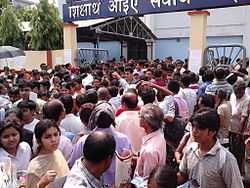All India Pre Medical Test
The All India Pre Medical Test (AIPMT) is an annual medical-college entrance examination in India. The exam is conducted by the Central Board of Secondary Education (CBSE), Delhi for admission to MBBS and BDS courses in several medical colleges around the country. At present, 15% of the total seats in all medical and dental colleges run by the Union of India, state governments, municipal or other local authorities in India, except in the states of Andhra Pradesh and Jammu and Kashmir, are reserved for candidates who pass this examination. Since 2014, the examination has been modified.

Benefit
The primary aim of this test, which is standardized all over India, is to make medical education available on an equitable basis to all regions of the nation and to foster inter-regional exchange. Until recently, the AIPMT was unusual in that it was one of the few all-India competitive examinations (along with the examinations for the defence services) based completely on merit and without any reservations. However, since 2006, under pressure from the Human Resources ministry headed by Arjuna Singh, reservations for SC, ST and OBC have been introduced in AIPMT also.
Exam pattern
Starting from 2014, the exam is conducted in a single stage that usually occurs on the first Sunday of May. The examination consists of one paper containing 180 objective type questions from Physics, Chemistry and Biology (Botany & Zoology). Candidates belonging to Jammu & Kashmir and Andhra Pradesh are eligible for this examination at this time but can seek admission only to the Armed Forces Medical College, Pune through it.
Exam changes
From 2010, the pattern of AIPMT has been undergoing changes. The examination was replaced by the National Eligibility cum Entrance Test (NEET-UG) but has now been reinstated with major changes such as doing away with the two stage format of the examination.
OBC reservation is being implemented under government directives, but only in central institutes, i.e., not in most of the colleges covered under AIPMT. More than 2500 MBBS and approximately 400 dental seats are available through AIPMT, but ranks up to 3500 can reasonably hope for selection due to overlap with other entrance exams.
27% seats are reserved for OBCs.
Scoring
Each question carries 4 marks. For each incorrect response, one mark is deducted from the total score. However, no deduction from the total score is made if no response is indicated for an item. Indication of more than one answer for a question is deemed an incorrect response and negatively marked. Candidates having more than 520 marks out of 720 can reasonably hope for selection.
Criticism
AIPMT is criticized for being conducted only in English and Hindi, making it harder for students where vernacular languages such as Tamil, Telugu, Marathi or Gujarati are more prominent. As an example, in September 2011, the Gujarat High Court acted on Public Interest Litigation by the Gujarati Sahitya Parishad for conducting the exams in Gujarati.[1] A second petition was made in October 2011.[2]
See also
References
- ↑ "Sahitya Parishad demands entrance tests in Gujarati". The Times of India. 2011-09-20. Retrieved 2011-11-03.
- ↑ "Another PIL seeks entrance tests in Gujarati". The Times of India. 2011-10-21. Retrieved 2011-11-03.
External links
| ||||||||||||||||||